HPV and Cancer: Why it Matters | What REALLY Causes Cervical Cancer and Why This Can Also Affect Men?
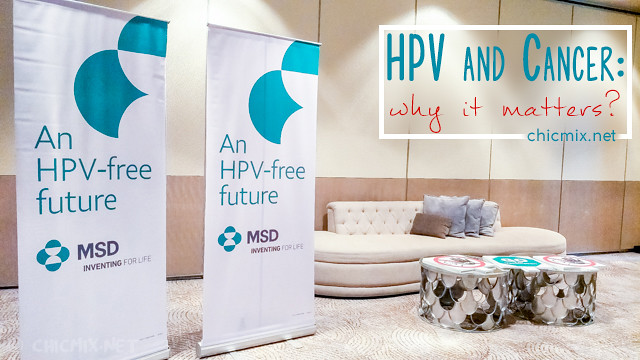
 |
| Photo from Google Search |
The Cause of Cervical Cancer... Among other things
If you thought that because Cervical Cancer only affects women and guys need not worry... THINK AGAIN.
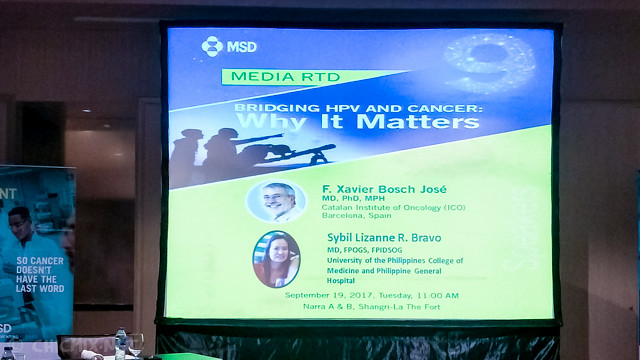
To treat and combat Cervical Cancer alongside the other types of cancer you need to know the cause. And from what I have gathered from the recent roundtable discussion entitled, “Bridging HPV and Cancer: Why it Matters”, it is NOT only females who have to be prepared but ALSO THE MALES.
WHY?
Because anybody can get the HPV or human papillomavirus which is the root cause of it all. From Genital Warts to Anal, Genital and Penile Cancer (for males), and Cervical cancer among others.
Any kind of genital contact even if it’s just the skin of the genital of an infected person, can result to transmission of HPV (Human Papillomavirus). HPV can be spread through oral, vaginal, or anal sex.
HPV causes virtually 100 percent of cervical cancer cases as indicated by the “Human Papillomavirus and Related Diseases Report” recently published by the ICO Information Centre, which is based in Barcelona, Spain. It is also known to cause other genital cancers in both males and females.
In the Philippines, cervical cancer is the second leading cause of cancer-related deaths among Filipino women, next to breast cancer. Although cervical cancer screening tests are readily available for early treatment or prevention, more than 6,000 Filipinas are still diagnosed with cervical cancer every year. Within five years from diagnosis, more than half of those women will die.
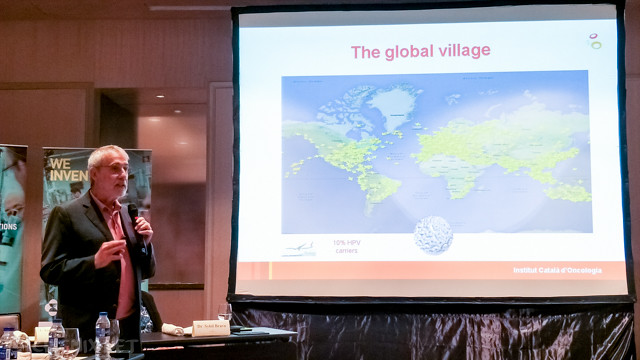 |
| Dr. F. Xavier Bosch |
In the discussion was the world renowned Dr. F. Xavier Bosch, Senior Consultant to the Cancer Epidemiology Research Program (CERP) at Catalan Institute of Oncology (ICO) Information Centre in Spain and Dr. Sybil Bravo, Obstetrician-Gynecologist Infectious Diseases Specialist and Clinical Associate Professor at the University of the Philippines - College of Medicine and Philippine General Hospital.
They shared insights on the incidence of HPV infection, relevance of the different HPV types, their association with several cancers, and the major barriers and success stories surrounding to the prevention of HPV infection.
HPV has a lot of types, but the most infamous of them is that HPV infection causes cervical cancer. It's got a lot of complicated strains and types that range from 1 to 52, something akin to the numbers that you would play in lotto.
Kidding aside, these strains carry different diseases, including the 7 most common high-risk types 16, 18, 31, 33, 45, 52, 58 and the 2 most common genital warts-causing types 6 and 11. (Told you, it's like lotto, but a sad type of jackpot.)
HPV strains 16, 18, 45, 52, 58, 31 and 33 are known to cause approximately 85 to 95 percent of anal, vulvar, and vaginal cancers. HPV strain 16 also causes 35 percent of penile cancers in the Philippines.
The average person’s lifetime risk of contracting HPV is 75 to 80 percent. Worldwide, there are approximately 527,624 new cases of cervical cancer reported every year; 7,200 new cases of anal cancer; and 1,800 new cases of penile cancer.
Symptoms of HPV
In both men and women, you can find genital warts in the groin. For women, the genital warts appear on the vulva but can also be present near the anus, cervix or even within the vagina. For men, it may appear on the penis, scrotum or around the anus.
This is why it is essential to have a papsmear and regular check up once every 6 months or so. Sometimes, HPV can also be transmitted during birth to an infant causing genital or respiratory system infections.
Prevention is BETTER than Cure

Recently, The Department of Health (DOH) with support from multi-stakeholder groups, has included quadrivalent human papillomavirus (HPV) vaccine in its school-based national immunization program to protect young girls against diseases caused by HPV infections.
The immunization initiative was previously implemented through the community-based approach. Armed with expert recommendations on the ideal model for service delivery given the target beneficiaries, the recent shift was brought by the DOH’s goal to vaccinate 720,000 young girls this year. From 20 provinces, the scope of the expanded program now spans 56 provinces and cities across the country.
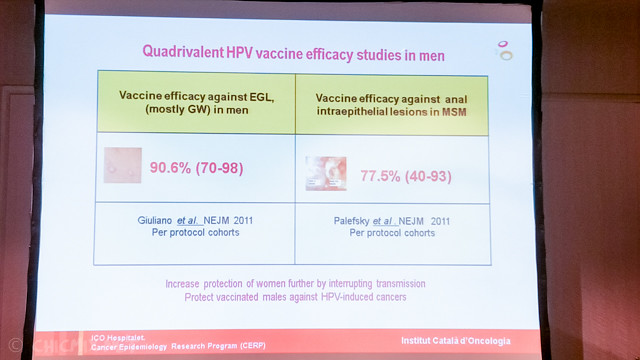
Dr. Bosch highlighted the need to focus on HPV strains that local epidemiology is able to show, in order to address these appropriately with vaccination – the primary means of prevention that is readily available.
Both Bosch and Bravo emphasized the need for continued multi-sector collaboration to help achieve an HPV-free future, and further spread awareness on the threat posed by HPV and the significance of cervical cancer screening and immunization.
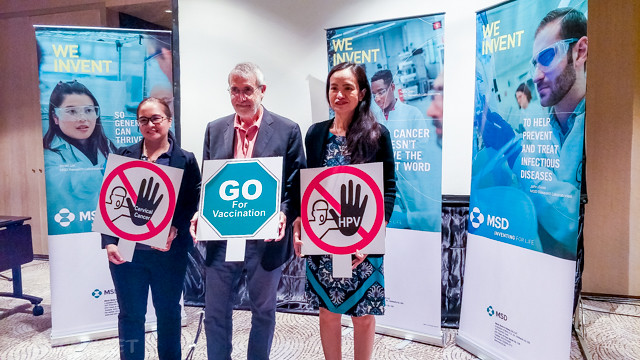 |
| Right to Left: Dr. Sybil Bravo and Dr. F. Xavier Bosch |
This includes government agencies, non-government organizations, the academe, medical community, private sector, members of the media, and particularly mothers who have the primary role of helping their daughters lead a brighter future away from the burden of vaccine-preventable diseases such as cervical cancer. To learn more about HPV, visit www.helpfighthpv.com.
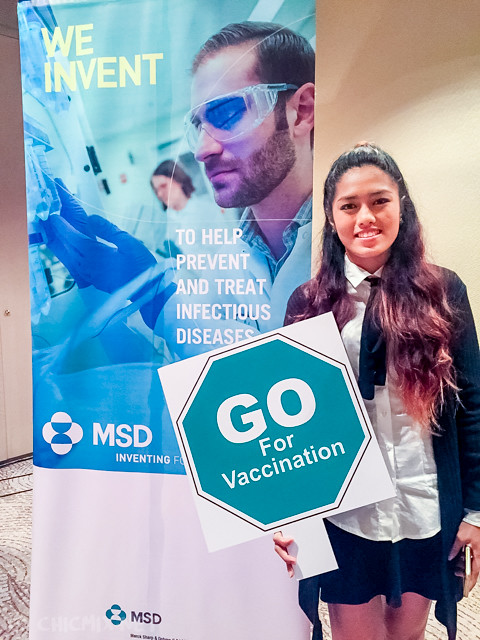

.jpg)

I love reading this! It's true that dating has changed drastically through the years. Reading this educated me more about HPV and cervical cancer. How I wish there are free vaccines that we could avail of to aid in the prevention of these diseases.
ReplyDeleteThis is so educational topic for these days.Cervical Cancer is more common nowadays.Glad to hear that there is a vaccination for HPV,Specially to prevent it spreading to the newborns.Pap smear is essential for ladies,but I still couldn't do mine after the child birth!
ReplyDeleteIm so old na and yet I still believe those myths about gettinf cervical cancer. Now, I know how one gets hpv and cervical cancer. I just hope the vaccine is not to expensive so most masa could avail of it.
ReplyDeleteUy, not old naman! Let's just put it to more mature? But yeah, I got that feeling too when I read this. 😔
DeleteYou can't get too much knowledge about these topics. And you are right that relationships have changed a lot but despite of that most of the people have no clue about possible diseases. I did not know much about cervical cancer either. But it makes me happy to hear that there are vaccines available for preventing some of those sicknesses.
ReplyDeleteIt is really important not to ignore and go to a check-up every year! In my country you get a letter from the doctor every 3 years to go for a smear, and you have to do it, otherwise they will keep sending letters until you go. I think this is really good cause it makes you do it. And young girls should all get the vaccine, it's such an innovative step into stopping the HPV to spread.
ReplyDeleteI'm grateful for my mom and my pediatrician that they have informed me about cervical cancer during my early teens. Plus, they made sure that I get a vaccination for it. I didn't enjoy frequenting the doctor for those shots as I don't like injections but still after reading how it can help prevent me from such kind of sickness in the future, I'm reminded of how blessed I am. Anyway, this is such an informative article for those who engage in sexual intimacy. -Me-An
ReplyDeleteI am happy to see that there are now vaccines and more awareness for the big C. My mom passed away because of it, and I will want to be part of the awareness to others. Very useful and informative to everyone.
ReplyDeleteI hope there will be more seminars like this for the teens. Sometimes our conservative culture hinders knowledge like this to be disseminated. It is really alarming. I've always known cervical cancer since I have PCOS and it can also lead to that. Glad, there's vaccine available now. It is pricey but worth the investment.
ReplyDeletewow there's a vaccine pala for HPV.. people tend to overlook this matter kasi..my mom used to remind my cousins about their kids na dapat kumpletuhin ang bakuna habang bata pa to prevent those diseases..
ReplyDeleteAs for cancer, we should all be cautious to our body.. if we feel something different , then it is better to contact a doctor rather than jumping into conclusion and ignoring it..
prevention is better than cure